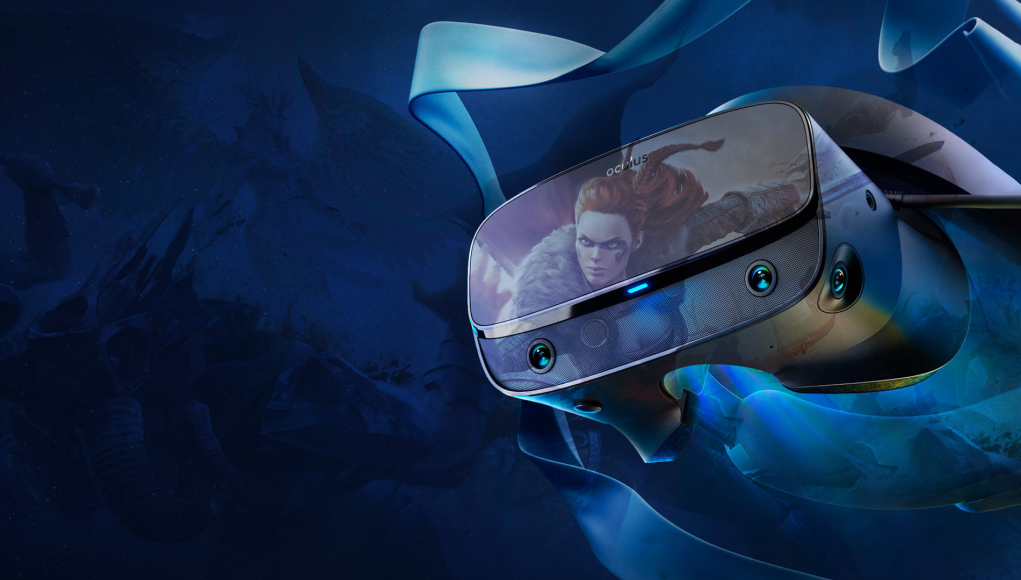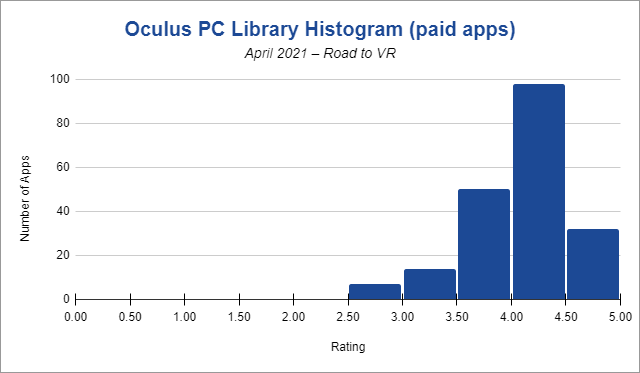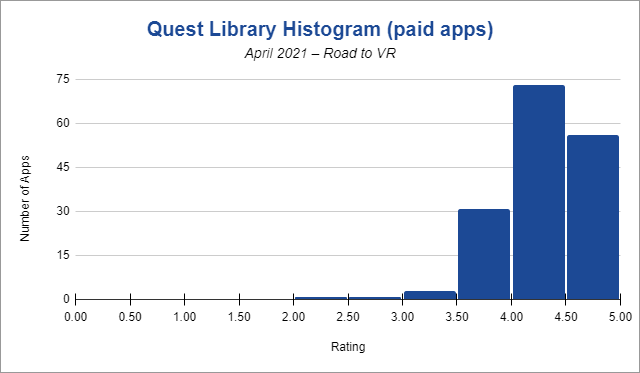A Better Way?
The data shows us that Facebook’s investments in Oculus exclusive content have positively benefited the content library early on, but that benefit shrank as time went on and VR games released in the library improved over time. But could the company have done more with the same money?
Some have argued that Facebook could have made a greater impact by making a larger number of smaller bets, instead of a smaller number of big bets on games aiming for AAA scope.
“When you fund a startup, your goal is to fund a company that will ultimately become a ‘unicorn’ (e.g. worth $1 billion). If you play the numbers game correctly, you can invest $10 million into 10 companies, and if just one of them becomes worth $1 billion someday, you’ve made your money back […],” said indie VR developer Gerald McAlister, in a conversation with Road to VR prior to taking a position at Oculus. “This seems to be the approach that Oculus took: Invest several tens of millions of dollars into some big studios, and hope that what comes out is good. The problem is that their goals are not aligned with what startups want. E.g. Oculus does not care about making a large profit from their investment directly, but just a decent profit with the ability to have more good titles on their platform. By taking this approach, Oculus has ended up in a situation where of the [hundreds of millions of dollars] they’ve supposedly [invested in VR content] they have ended up with no games to get above a 90 on Metacritic (the highest rated is Lone Echo at 89 and the lowest rated is the recent Medal of Honor). They have a half dozen AAA games, but few with the quality the platform needed.”
McAlister believes the company would have made a greater impact in improving its VR content library if it had made many smaller bets.
“This is where I say their approach should have actually been the opposite: split up [the content investment] and give it to a bunch of smaller studios […]. Beat Saber has as high of a rating has Half-Life: Alyx, yet a fraction of the budget (more than likely). Superhot VR has an 83 on Metacritic, well above what Medal of Honor has, yet started as a game-jam game. Games like LOW-FI and Smash Drums are high risk, but also potentially high reward for Oculus in terms of what they bring to the platform,” McAlister said. “$100,000 to an indie dev stretches much farther than I think Oculus and others realize, and would allow them to fund thousands of games in an instant. If just 1% of those games turned into another I Expect You to Die title, that would be 50 titles with higher scores than what Medal of Honor had. That’s a major selling point for VR right now, and would likely open the flood gates in ways that most consoles haven’t even seen before.”
Without knowing the exact amounts Facebook has spent funding various game, it’s hard to conclusively say if their approach was ‘worth it’, or they would have been better off by spending the money in different portions.
With Quest, Facebook opted to curate the headset’s content library for the first time. The company said it believed it made a mistake in having an open store with Oculus PC, which led to too many low quality titles that customers found it difficult to find the gems. The curated approach on Quest has led to a smaller library of higher quality content compared to Oculus PC’s larger quantity of lower quality content:
However, to McAlister’s point, only four of Facebook’s ‘big bet’ games are among the 20 best rated Oculus PC titles today.
| Rank | Name | Rating (# of ratings) |
| #1 | The Room VR: A Dark Matter | 4.89 (299) |
| #2 | Wolves in the Walls | 4.83 (1,139) |
| #3 | Beat Saber | 4.81 (15,137) |
| #4 | Moss | 4.8 (932) |
| #5 | Until You Fall | 4.73 (186) |
| #6 | Trover Saves the Universe | 4.71 (302) |
| #7 | Lone Echo (Oculus Studios, 2017) | 4.7 (4,851) |
| #8 | Brass Tactics (Oculus Studios, 2018) | 4.69 (753) |
| #9 | I Expect You To Die | 4.68 (1,251) |
| #10 | Robo Recall (Oculus Studios, 2017) | 4.68 (11,336) |
| #11 | Electronauts | 4.67 (103) |
| #12 | Racket: Nx | 4.66 (112) |
| #13 | Space Pirate Trainer | 4.64 (726) |
| #14 | Dance Central (Oculus Studios, 2019) | 4.64 (341) |
| #15 | The Thrill of the Fight | 4.63 (561) |
| #16 | Vox Machinae | 4.62 (383) |
| #17 | The Invisible Hours | 4.62 (224) |
| #18 | Five Nights at Freddy’s VR: Help Wanted | 4.61 (655) |
| #19 | Bending the Light | 4.61 (173) |
| #20 | BlazeRush | 4.61 (780) |
While it’s true that Facebook has bet big on some 25 titles, not all of the money it’s spending on VR content has gone there. In addition to money that went to non-game content (like immersive video and other non-game media), Facebook has made efforts to reach smaller developers through Oculus Start and Oculus Launch Pad.
Oculus Start is designed to give indie VR developers a direct line of contact with the company, and offer support, dev kits, software, and more. Oculus Launch Pad is a ‘boot camp’ style program which aims to increase the diversity of developers building content for VR.
For Launch Pad, Facebook says it “may award competitive scholarships in the amount of $5,000–$50,000 to qualifying candidates that require additional financial support in taking their concepts to the next level.”
Though the funding that’s flowing through such initiatives pales in comparisons to the ‘big bets’ Facebook has made. The latest we’ve been able to find is that the program has distributed some $900,000 in grants across 37 projects (~$25,000 on average per project) from the start of the program in 2016 through early 2018. It’s a drop in the bucket (0.2%) compared to the $500 million Facebook said it committed to funding VR content.
– – — – –
With Facebook resetting its VR ambitions with Oculus Quest, it has a rare chance at a do-over. While there may be lessons to learn from its first attempt, so far we’re seeing the company continue to lean into big bets on exclusive VR content.









